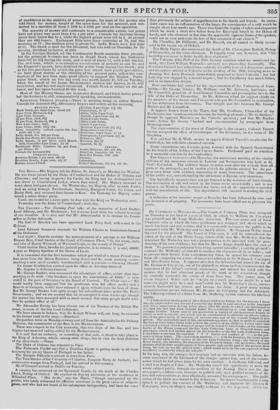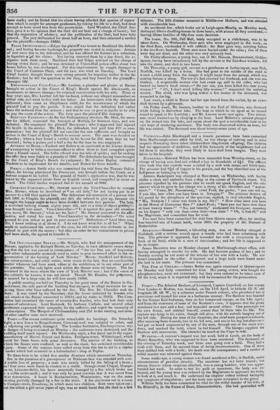DE CBESPIONV /'. WELLESI.Er.—The Court of COM:Y011 Pleas was occupied
on Thursday in the trial of a case of libel, in which S r William de Creepigny was plaintiff and Mr. Long Wellesley defetelant. The caee arose out of those Chancery suits in whish the latter gentleman was emerged. and about which so much has been and written. that it is reasonable to suppose the public to be nauseated with Mr. Wellesley and his family affitirs. Mr Sergeant Wilde stated the case for the plaintiff The Court of Clay:eery, it will be remembered. decided, at the suit of the Misses Long, sisters of the late Mrs. Wellesley, that the defendant Mr. Wellesley was not a proper person to be intrusted with the guardianship of his own children ; but that the Misses Longs should hpve the care sie them. To prevent tee judgment from being carried into effect, (said the plaintiff's counsel) Mr. %Wellesley set himself to traduce the characters of (hi se ladies ; and to prevent their friends from countenancing them, he spread his calumny over them ale—imputing tile crimes of incest and adultery to Sir Williamd Crespigny and Miss Emma Long. It appears also that the deesselant had gained the ear of Mr. Heaton the Cre-ipigny, son of the plaintiff, to whom he fi!st communicated the imputation of his &tiler's criminal intercourse, and imbued his mind with the opinion that he had abundant proofs of the truth of the accusation, thought he carefully concealed the nature of them from him. This young man, of whom Sergeant Wilde said he " might he a Week man— he might be a bad man—he might even be a mad man"—fell into Mr. Wellesley's views, unconsciously forwarded his ohjects, and became his dupe. A good many written communications passed between Mr. Heaton de Crespigny and the defendant
The following extract of a letter from Mr. \Wellesley to hint contains the libellous matter.
I fully believe in the guilt of Miss Emma with your father, for the reasons I have already expressed to you, nor can I conceive any doubt in your mind as to the improper and illict intercourse having taken place, after the mode in which you mentioned to me, that the fact had been brought under the consideration of your father by your younger brother. I have also in my possession a variety of circumstances known to others as well as myself, and which can be corroborated in affidavits by others, indicative of the gross laxity of manners, of obscene acts, and of the violent temper of this person. The melancholy part of this unfortunate question is, that in order to establish the fact of these ladies being unfit to have the custody of my children, I must enter into a detailed account (which dozens of people will be found to corroborate) of the domestic habits of the Misses Long and the late Lady Catherine Long, at Draycott-house an& elsewhere, which will involve almost all the branches of the late Lady Catherine Long. I shall have to recount the repeated * * * stories and conduct of —, in the pre settee of these ladies. The connived-at adultery, — with the footman, for years under the roof, and while hi the service of the late Lady Catherine Long ; the history of the Barry family ; the drinking, the guzzling of the Draycott family ; the ignorance, the total absence of all literary acquirements of these people, and, on the part of the present Miss Long, her acts (to use the mildest term), which could alone be the consequence of that hereditary eccentricity which she inherits."
In the lung run' the younger de Crespigny had an interview with his father, became convinced of the falsehood of the charges against him, and of the countenance which he bad given them by his own conduct. A challenge followed, and a duel was fought at Calais. Mr. Wellesley seized iIi pportunity to make the whole subject public, through the medium of the Sliminy Times and the Age newspapers,—taking care, however, to publish only such garbled extracts of let tens and conversations as most effectually answered his own purpose. The publication of the libels was traced to the defendant. Sir James Scarlett made a long speech to palliate, the conduct of Mr. Wellesley, and implicate Mr. Heaton dr Crespigny, who, he alleged, was chiefly to blame ft the exposures -which has been made; and he hinted that his client having afforded that species of repara • tion which is sought for amongst gentlemen, by risking his life in a duel, had done enough to have saved him from this prosecution. Lord Wynford, the Chief Justice, gave it as his opinion that the libel did not bear out a charm ofincest ; but that the imputation of adultery, and the publication of the libel, had been fully proved. The jury deliberated for about half an hour, and then returned a verdict for the plaintiffs—damages 10004 FALSE IMPRISONMENT.—Edgar the plaintiff was tenant to Buckland the defendant ; and having become bankrupt, his property was vested in assignees. Arrears of rent were due to the defendant, and he was offered the fixtures at a valuation, in liquidatios ;of his claims. Not having removed them by a day fixed, the assignees took them away. Buckland then had Edgar arrested on the charge of having stolen them ; and he was detained at Union-Hall police-office about two hours before he was discharged. For this imprisonment he sought damages in the Court of Common Pleas, and the case was tried on Tuesday. The Lord Chief Justice thought there were strong grounds for imputing malice to the defendant; but he left the question to the Jury, and they found for the plaintiff— damages 50/.
UNFASHIONABLE Ceisi-Coe.—Mr. Leather, a plumber and glazier at Barnet brought an action in the Court of King's Bench against Mr. Duckworth, an auctioneer, to recover damages for criminal conversation with his wife. Three or foqr years ago, Mrs. Leather left her husband, without any alleged misconduct on either side, and went to live with her father. An intercourse with the defendant followed; • then came an illegitimate child, for the maintenance of which the plaintiff had to pay the parish. It was urged that the defendant had rather been the seduced than the seducer ; and that he was so poor as hardly to be able to pay the casts of the action. The Jury gave the plaintiff 25/. damages. ELECTION EXPENSES.—At the last Parliamentary elections Mr. Dick, the member for Alford, contested the borough of Malden; for fourteen days, and was defeated. He employed the plaintiff Berryman ; who it appeared had injured his health in the service. Mr. Dick, the defendant, had paid him 67/. as compensation • but the plaintiff did not consider the sum sufficient, and brought an action in the Court of King's Bench to recover more. The case was decided on Tuesday; when a Jury found a verdict in his favour for 25/. more than lie had received ; being a guinea and a half a day for the time he was employed. ATTEMPT TO BRIBE.—Tuckett and Ratten were convicted at the Exeter Assizes of a conspiracy to bribe a revenue-officer to allow them to land smuggled spirits front a French vessel. The bribe offered was ten tubs of spirits; and for making the offer they were liable to a penalty of 500/. The defendants having been brought to the Court of King's Bench fin j udgment: Mr. Justice Bayley sentenced Tuckett to be imprisoned for six months, and Ratten for three months.
PIRACY.—Aaron Smith who was comniitted for trial from the Thames Police. office, for having plundered the •PreVoyant, was brought before the Court, on a habeas corpus to be bailed. The ground of Smith's application was' that he was taken by the supposed pirate fmm an English vessel, and compelled to Serve on board. The Chief Justice required bail to the amount of 900/.
CHANCERY Coreremere—Mr. Stewart moved the Vice-Chancellor to commit Mrs. Burnes, whom he described as an old lady," for not having put in an answer to a bill filed against her. The defendant was executrix of a persOn who left 100/. to Chaplin the plaintiff, and this she refused to give up, because she thought the legacy ought to have been.divitkl between two persons. The 1ady, a wretched.looking woman. eighty years old, and in a-state of abject eitegrtywas brought into court. Vice-Chancellor—" Is it against this poor old creature you move, Mr. Stewart ;" what are the facts ? Mr. Stewart answered in the affirmative, and stated his case. Vice-Chancellor to the defendant—" On what ground do you refuse to put in your answer ?" Defendant—" Lord bless you, Sir, 1 know nothing at al! about it. I do not know what this is all for." When anade to understand the 3ature of the case, the old woman was obstinate in her refusal to part with the money ; but after an order for her commitment to prison had been made, she agreed to transfer it.



















 Previous page
Previous page